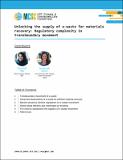| dc.description.abstract | Globally less than a fifth of e-waste generated was collected and recycled in 2019, with the remaining landfilled, reused or recycled informally, largely in developing regions. A key challenge to unlocking the supply of e-waste for materials recovery is the regulatory complexity associated with transboundary movement of e-waste. International waste management policies aim to protect human health and the environment from the adverse impacts of hazardous waste management by controlling its transboundary movement. Such policies have been successful in setting global norms for environmentally sound e-waste management and developing multi-stakeholder partnerships to innovate sustainable approaches to emerging waste challenges. However, international and national waste management policies often create unintended barriers to export and import of end-of-life recyclable products and components. Issues such as discrepancies in definitions and classification of equipment, non-standardized protocols, administrative challenges with tracking waste and non-uniform enforcement of regulations, often lead to unanticipated delays and cost increases in e-waste movement, thus posing barriers to developing a reliable supply of secondary materials from e-waste. This white paper, co-authored by the MCSC and Apple, explores these challenges and presents some possible ways to move forward. | en_US |
